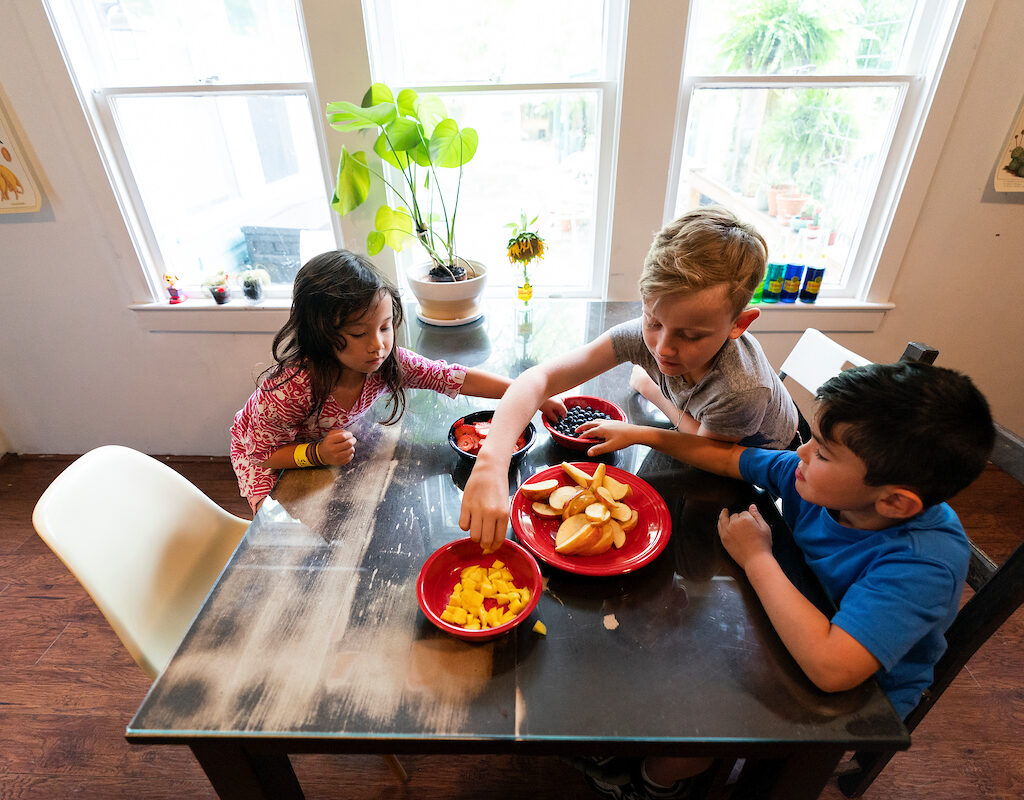Balancing Food & Play
- Type
- Program

Overview
Contact
College Station, TX 77843-2251
Monday – Friday 8:00 am – 5:00 pm
Obesity in the United States is an epidemic- and has been for decades. Texas has the 8th highest obesity rate for youth ages 10-17 with 17.3% being obese. Childhood obesity results in extra health care costs; on average $12,900 more in medical costs than a child with normal weight and is also associated with poorer educational outcomes including a lower GPA, lower reading and math scores, and more school absences.
Teaching children how to live healthy is a good way to help them grow into healthy adults. Balancing Food & Play (3rd thru 5th-grade curriculum) was developed to address children’s health issues by developing lifelong healthy behaviors through nutrition, physical activity, and family engagement. The curriculum is based on the principles of the MyPlate Food Guidance System and the Social Cognitive Model; targeting early childhood health habits while providing youth the opportunity to learn about nutrition and physical activity in an engaging and exciting way, exploring creativity in the classroom, home kitchens, and playgrounds.
AgriLife Extension educators are trained on the program and then in turn train local teachers to implement it throughout the school day. All 20 lessons are available via the Teacher's manual and online virtual lessons are available for teacher use as well. Student journals and parent newsletters/assignments support self-reflection and family engagement. All components of the curriculum, including the online virtual lessons, are available in both English and Spanish.
More choices in Caregiving
- Course
Promoting creativity in an early childhood setting is critical for the development of children’s brains. Environments, daily interactions, and experiences are all opportunities to promote creativity in young learners. Creativity can be expressed through the visual arts, music and movement, and dramatic arts.
After completing this 3-hour course, the learner will be able to describe the elements of creativity, explain how environments can encourage creativity, examine how the arts can support development across all domains in early childhood, and discuss the different categories of creative arts with connections to the four developmental domains. - Course
To grow and excel as an early childhood professional, you must reflect on your teaching practices and child observation to make changes and adjustments to your teaching approach. Intentional early childhood professionals engage in reflective practices and create a professional development plan that builds upon their strengths and enhances their teaching.
After completing this 4-hour course, the learner will be able to describe what an intentional early childhood professional is, explain what reflective practices are and how to implement this information effectively to improve their teaching, explain why being intentional and reflective promotes the development and learning in the children they are teaching, and create a professional development plan based upon their strengthens. - Course
Intentionality is one of the hallmarks of a high-quality learning program. This involves not only using a curriculum that aligns with child development and guidelines, but also ensuring instruction is targeted to the needs of each child in your classroom.
This 4-hour course for early learning educators discusses how to use the cycle of curriculum learning to plan whole group, small group, and individual level to appropriately meet the needs of all learners. - Course
A major component of completing the process for the Child Development Associate (CDA) Credential is building your CDA Professional Portfolio. This portfolio contains all the documentation needed to meet the requirements of the CDA credential and will be part of your CDA Verification visit. This resource binder should be built to be used by you as you work with the children and families you serve.
In this four-hour course, the learner will be able to identify the essential components that must be included in the CDA Professional Portfolio, including the family questionnaires, the Reflective Dialogue Worksheet, the resource collection items, and the accompanying competency statement for each of the six areas required and the Professional Philosophy Statement. This binder will be part of the resources examined by the CDA Professional Development Specialist and used as a reflection tool during the CDA Verification Visit. - Course
Knowing what children can do and what they know is powerful information that can guide early learning teachers to create appropriate learning experiences for their children. The purposes and types of assessments are examined.
This 4-hour course for early learning educators is designed to review the purposes of assessment, how to evaluate and interpret the results, and create a plan to share results with families. - Course
Collaboration is an integrated part of how we build successful relationships, make connections, create support systems, and involve the community in the field of early childhood. Professionalism plays a critical role in how early childhood educators foster their collaborative efforts. Learning how to collaborate creatively and effectively is essential to being an early childhood professional.
After completing this 3-hour course, the participants will be able to explain what collaboration is, describe elements of professionalism, and list ways to collaborate in the early childhood profession.
